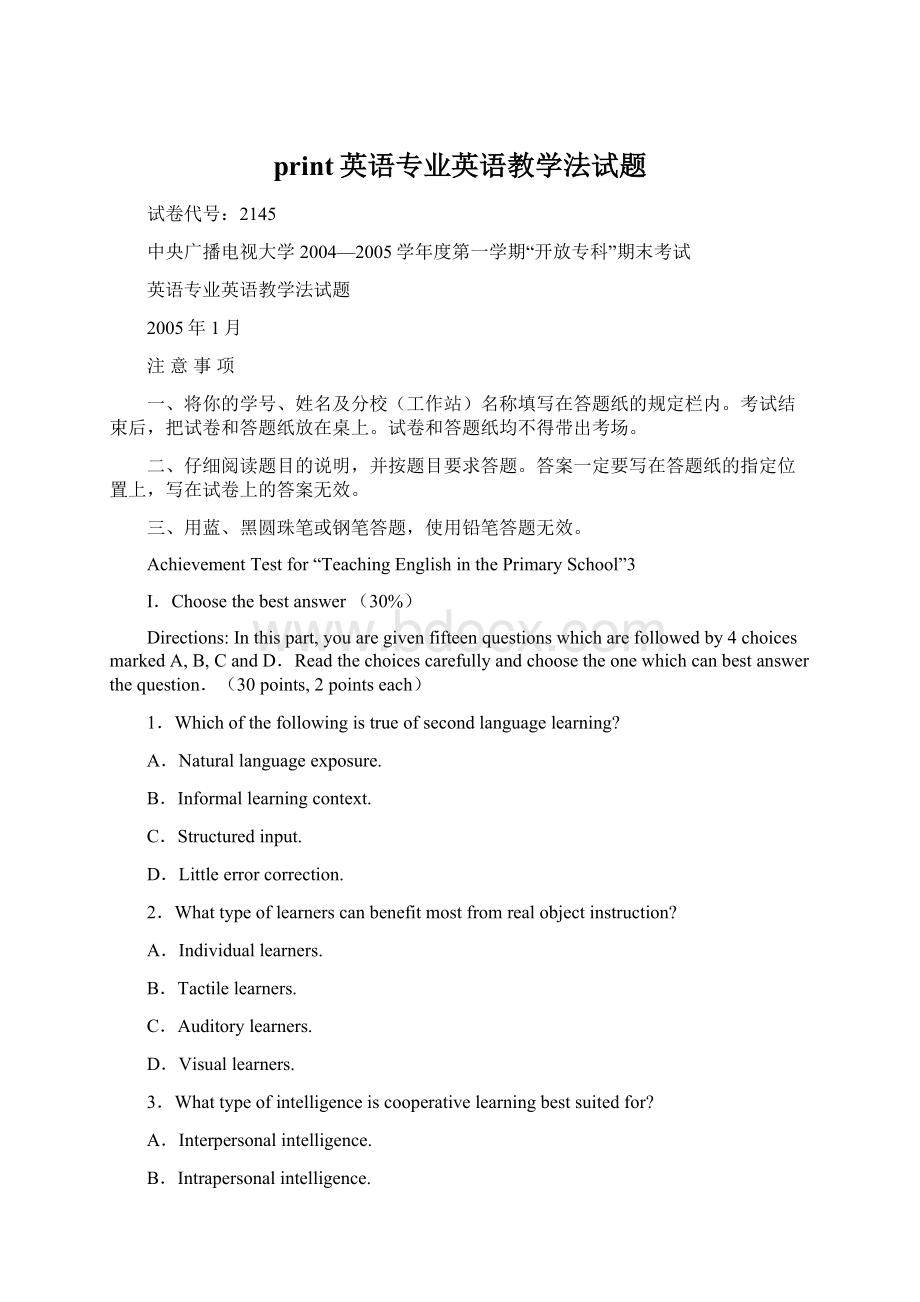print英语专业英语教学法试题.docx
《print英语专业英语教学法试题.docx》由会员分享,可在线阅读,更多相关《print英语专业英语教学法试题.docx(12页珍藏版)》请在冰豆网上搜索。

print英语专业英语教学法试题
试卷代号:
2145
中央广播电视大学2004—2005学年度第一学期“开放专科”期末考试
英语专业英语教学法试题
2005年1月
注意事项
一、将你的学号、姓名及分校(工作站)名称填写在答题纸的规定栏内。
考试结束后,把试卷和答题纸放在桌上。
试卷和答题纸均不得带出考场。
二、仔细阅读题目的说明,并按题目要求答题。
答案一定要写在答题纸的指定位置上,写在试卷上的答案无效。
三、用蓝、黑圆珠笔或钢笔答题,使用铅笔答题无效。
AchievementTestfor“TeachingEnglishinthePrimarySchool”3
I.Choosethebestanswer(30%)
Directions:
Inthispart,youaregivenfifteenquestionswhicharefollowedby4choicesmarkedA,B,CandD.Readthechoicescarefullyandchoosetheonewhichcanbestanswerthequestion.(30points,2pointseach)
1.Whichofthefollowingistrueofsecondlanguagelearning?
A.Naturallanguageexposure.
B.Informallearningcontext.
C.Structuredinput.
D.Littleerrorcorrection.
2.Whattypeoflearnerscanbenefitmostfromrealobjectinstruction?
A.Individuallearners.
B.Tactilelearners.
C.Auditorylearners.
D.Visuallearners.
3.Whattypeofintelligenceiscooperativelearningbestsuitedfor?
A.Interpersonalintelligence.
B.Intrapersonalintelligence.
C.Logicalintelligence.
D.Linguisticintelligence.
4.Whatdoesthefollowingpractise?
※PeerandIwenttothecinemayesterday.
Peterand※Iwenttothecinemayesterday.
PeerandIwenttothe※cinemayesterday.
PeerandIwenttothecinema※yesterday.
A.Stress.
B.Articulation.
C.Liaison.
D.Intonation.
5.Whatlearningstrategycanthefollowinghelptotrain?
Matchtheadjectivesontheleftwiththenounsontheright.
A.Grouping.
B.Collocation.
C.Imitation.
D.Imagery.
6.Whichofthefollowingisacommunicationgame?
A.Bingo.
B.Wordchain.
C.Rearranginganddescribing.
D.Cross-wordpuzzle.
7.Whichofthefollowingcanhelptrainspeaking?
A.Listenandfollowinstructions.
B.Simonsays.
C.Pairsfinding.
D.Matchcaptionswithpictures.
8.Whichofthefollowingactivitiesismostappealingtochildren’scharacteristics?
A.Cross-wordpuzzle.
B.Formalgrammarinstruction.
C.Recitingtexts.
D.Role-play.
9.What’stheteacherdoingbysaying“Whowantstohaveatry?
”?
A.Controllingdiscipline.
B.Givingprompt.
C.Evaluatingstudents’work.
D.Directingstudents’attentiontothelesson.
10.Whichofthefollowingactivitiesisthemostsuitableforgroupwork?
A.Guessinggame.
B.Storytelling.
C.Information-gap.
D.Dramaperformance.
11.Whichofthefollowingbelongstolearningoutcomes?
A.Role-plays.
B.Sequencingpictures.
C.Surveys.
D.Worksheets.
12.Whichofthefollowingbestdescribesfirstlanguageacquisition?
A.Care-takertalk.
B.Minimalpairpractice.
C.Selectedinput.
D.Timelyerrorcorrection.
13.Whichofthefollowingseatingarrangementsismostsuitableforawholeclassdiscussion?
14.Whatistheteacherdoingintermsoferrorcorrection?
“S:
Igotothetheatrelastnight.”
T:
YouGOtothetheatrelastnight?
A.Correctingthestudent’smistake.
B.Hintingthatthereisamistake.
C.Encouragingpeercorrection.
D.Askingthestudentwhetherhereallywenttothetheatre.
15.Whichofthefollowingquestionscanbeusedinthequestionnaireforassessingparticipation?
A.Didyougetallthequestionsrightintoday’sclass?
B.Didyoufinishthetaskontime?
C.Canyouusethestrategieswehavelearnedtoday?
D.Whatdidyoudoinyourgroupworktoday?
II.Matching(20%)
1.Matchthelearningstylesontheleftwiththetypeofactivitiesontheright.(4points)
1)VisuallearnersA.Handwork
2)KinestheticlearnersB.Picturetalking
3)AuditorylearnersC.Playacting
4)TactilelearnersD.Songandmusiclistening
2.Matchthetypesofintelligenceontheleftwiththeformoflearningontheright.(4points)
1)LinguisticintelligenceA.Doinghands-onactivities
2)MatchandlogicalthinkingB.Sketching
3)SpatialintelligenceC.Verbalizing
4)Bodily/KinestheticinteligenceD.Conceptualizing
3.Matchtheactivitiesontheleftwiththelanguagefocusontheright.(4points)
1)GroupingwordstogetherA.Reading
2)MinimalpairpracticeB.Vocabularylearningstrategy
3)LabelingpicturesC.Pronunciation
4)SequencingtheeventsaccordingtothestoryD.Writing
4.Whatistheteacherdoing?
(4points)
1)Now,youcanbegin.A.Checkingunderstanding
2)Allright,Ithinkitistime.B.Endingtheactivity
3)Canyoutwoshowushowtowork?
C.Demonstratingtheoperation
4)WearegoingtodotwoD.Givingthestart
thingstoday.Tom,can
youtelluswhattheyare?
5.Matchtheactivitieswiththerelevantclassroomarrangement.(4points)
1)SpeakingchainsA.Wholeclasswork
2)RoleplayofadialogueB.Individualwork
3)GuessingtheobjectC.Pairwork
4)SentencecompletionD.Groupwork
Ⅲ.Multiplechoicequestions(10%)
Directions:
Inthispart,youaregivenfivequestionswhicharefollowedby4choicesmarkedA,B,CandD.Readthechoicescarefullyandchoosethesuitableanswer(s)tothequestion.Youmayhavemorethanoneanswertoeachquestion.(10points,2pointseach)
1.Whichofthefollowingrolesdotheprimaryschoolteachersplay?
A.Aprompter.
B.Aparticipant.
C.Anassessor.
D.Acontroller.
2.Whichofthefollowingfeaturesaretrueofchildreninlearningalanguage?
A.Childrencannotconcentrateforverylong.
B.ChildrenlearnEnglishbecausetheythinkitinteresting.
C.Childrenarenotgoodatplanningandmonitoring.
D.Childrenaregoodatunderstandingconcretethings.
3.Whichofthefollowingbelongtoformativeassessment?
A.Learnerportfolio.
B.Testresults.
C.Classroomobservation.
D.Studentdiaries.
4.WhichstatementofChineseandEnglishphoneticsystemsareright?
A.Englishhasasmanyas24vowels,whileChinesehasnone.
B.Englishhasalotofcombinedconsonants,whileChinesehasnone.
C.StresscanchangethemeaningofawordinEnglish,andtonecanalsochangethemeaninginChinese.
D.Englishwordsoftenhavemorethanonesyllable,whileChinesecharactersusuallyhaveonlyonesyllable.
5.Iftheclassisnoisy,whichofthefollowingshouldyouchoosetosettletheclass?
A.Askthewholeclasstocopyalistoffoodwordsontoapieceofpaperfromtheboard.
B.Askthepupilstolistenandwritedownthenumberofpicturesyoustickontheblackboard.
C.Askthechildrentotakeouttheircardsanddopairedpractice.
D.Askchildrentopreparethedialoguetogetreadytoact.
Ⅳ.ShortAnswerQuestions(20%)
Directions:
InthisparttherearefourquestionsaboutEnglishTeachingMethodology.Writedownyouranswersinbrief.Youwillbeassessedinthepointsyoupresentandthewayyoupresentthem.(20points,5pointseach)
1.WhyisitnecessarytouseL1inforeignlanguageinstruction?
Giveatleasttworeasons.
2.Whataretherelationshipanddifferencesbetweentestingandassessment?
3.Whatdoesthefollowingsupport,formativeassessmentorsummativeassessment?
Whyorwhynot?
Self-assessmentSheetYes,Partly,No
1.IwasabletoselectastoryIaminterestedin.□□□
2.ItriedtoguessfromthecontextwhenImet□□□
newwordsinthestory.
3.WhenIfailedtoguessoutthewords,Ireferred□□□
totheChineseversionforreference.
4.Iskimmedthestorytofirstfindwhatitis□□□
mainlyabout.
5.Ithenreadthestorycarefully,interestedin□□□
someofthedetails.
6.WhenIwasrequiredtoretellacharacterIlike□□□
bestorahappeningwhichattractedmy
attention,Iscannedthestoryagainforsome
details.
7.InthediscussionwithothersIfoundthatIwas□□□
abletogettherightinformationveryquicklyas
IreadinthewayIhadlearnt.
8.Iamsatisfiedwithmyreadingthistime.□□□
4.Whatmightbethereasonifyourstudentsmisbehaveinclass?
Mentionatleast3reasons.
V.Activitydesigning(20%)
Directions:
Inthispart,youaretodesigna10-minutespeakingactivityaccordingtothematerialgiven.Theactivityshouldinvolvethefunctionoforderingandtherelevantstructures.Makesureyouincludealltheitemsofanactivityaccordingtothetablegiven(objective,organizationtype,procedure,assumedtime,predictedproblemsandsolutions).Makesureyougivetheassumedtimeforeachstep.
试卷代号:
2145
中央广播电视大学2004—2005学年度第一学期“开放专科”期末考试
英语专业英语教学法试题答案及评分标准
(供参考)
2005年1月
Ⅰ.Choosethebestanswer
本题为单选题,共15个小题,30分,每题2分。
1.C2.D3.A4.A5.B6.C7.C8.D9.B10.D11.C12.A13.D14.B15.D
Ⅱ.Matching
本题为匹配题,共5个小题,20分,每题4分,匹配对一项得1分。
1.1)---B2)---C3)---D4)---A
2.1)---C2)---D3)---B4)---A
3.1)---B2)---C3)---D4)---A
4.1)---D2)---B3)---C4)---A
5.1)---D2)---C3)---A4)---B
Ⅲ.Multiplechoicequestions
本题为多项选择,共5个小题,20分,每题2分,全部选项都选择正确方可得分。
1.ABCD
2.AD
3.ACD
4.BCD
5.AB
Ⅳ.Shortanswerquestions
本题为简答题,共4题,每题5分,共20分。
每题中的两点各占2分,其中行文占1分。
1.本题只要能回答出两点即可得4分,不要求语言一致,只要主要意思说出即可。
行文无语言错误,符合逻辑即可得1分。
1)Itwillbeverytime-consumingtotrytoexplainthingsinthetargetlanguageandpossiblycausemoreconfusion.
2)Itmaybemosthelpfultoviewpupils’useofL1asausefulstrategyforcommunicatingatastagewhentheydonothaveenoughEnglishtoexpresstheirownideas.
3)Whenwelearnasecondlanguage,wealwayssetoutformalanguagewealreadyknow,i.e.ourmothertongue.Whetherwelikeitornot,thenewlanguageislearntonthebasisofapreviouslyacquiredlanguage.
4)L1istheyardstickandguidetoournewL2.Werecognizetheexistenceoflanguageuniversals.SowecanuseourL1knowledgetofacilitateourlearningofL2.Infact,anindividuallearninganL2tendstotransferrules,habits,andmeaningsfromhismothertongue.
5)Atthenovicestage,itmaybeusefultofallbackoncomparisonsbetweenL1andL2andexplanationsofL2inL1terms.Itisverydifficulttomakeeverythingcleartothebeginners,whoaretoopoorintheforeignlanguage.
2.本题本两部分,区别部分能回答1)—3)中的一个可得1分,两个可得3分。
有关关系部分,只要能回答出4)中的测试是评估数据的收集方式之一即可得1分。
行文无语言错误,符合逻辑即可得1分。
1)Testingoftentakesthe“pencilandpaper”form,andisexpressedbyamarkorgrade,whileasses